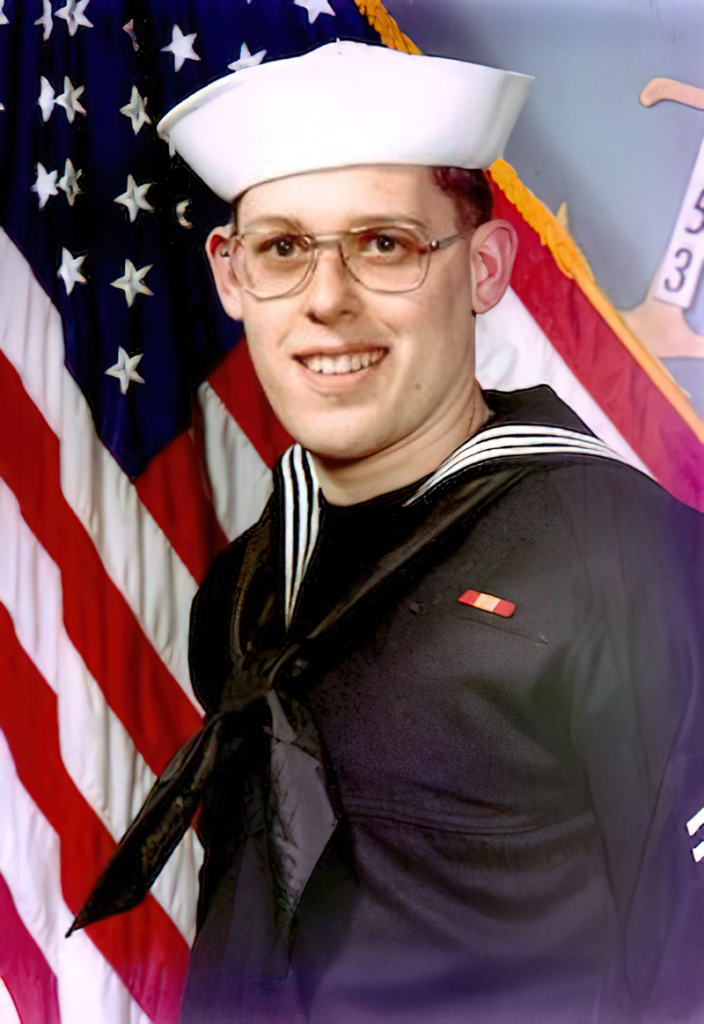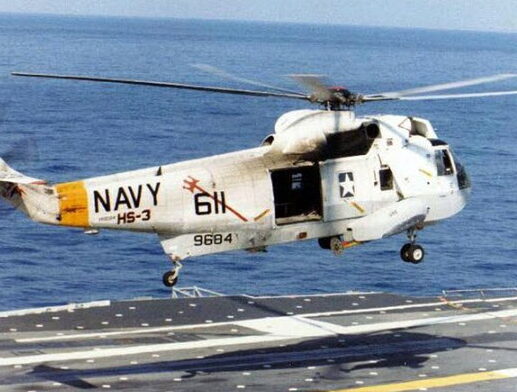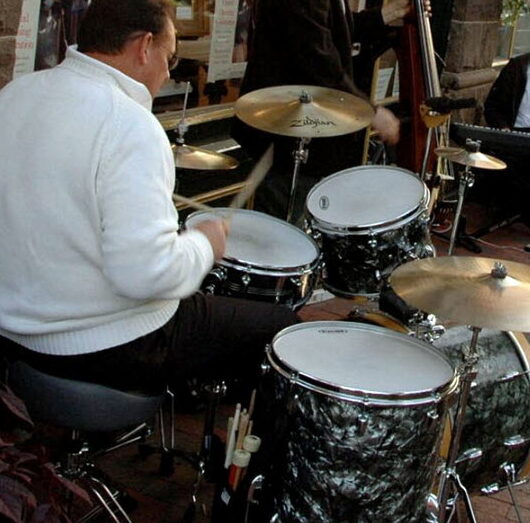PRESERVING A MILITARY LEGACY FOR FUTURE GENERATIONS
The following Reflections represents MUCS James E. Richards’s legacy of his military service from 1971 to 1995. If you are a Veteran, consider preserving a record of your own military service, including your memories and photographs, on Togetherweserved.com (TWS), the leading archive of living military history. The following Service Reflections is an easy-to-complete self-interview, located on your TWS Military Service Page, which enables you to remember key people and events from your military service and the impact they made on your life. Start recording your own Military Memories HERE.
Please describe who or what influenced your decision to join the Navy.

I was drafted into the military during the Vietnam War and decided to join the Navy instead of entering the Army. My late uncle, a career Navy man, said to me when I was young, “Son, if you ever have to join the military, join the Navy. “You get three squares a day and a dry place to sleep!” I remembered those words, and when it came time to enlist, it was the Navy for me.
The strange thing is that I realized that I really did find a home once in the Navy. I enjoyed the self-discipline you had to have to succeed in the military and found that I really liked my job and the shipmates I served with. I was out of “A” School and at my first command for about a month when I was ordered to sea. I enjoyed sea duty, especially the days steaming underway. I found the solace of being at sea very enjoyable. I was having such a great time in uniform, and I decided to keep re-enlisting and ended up with a wonderful 24-year career.
Whether you were in the service for several years or as a career, please describe the direction or path you took. Where did you go to boot camp, and what units, bases, ships, or squadrons were you assigned to? What was your reason for leaving?

I truly had a wonderful career. Interestingly, I did not audition for the music program until I arrived at Basic Training. I had just joined the Navy to get out of the Army. By chance, because I noted on a form I filled out in Boot Camp, I was scheduled for an audition for the Recruit Drum and Bugle Corps. I auditioned for MU2 Tom Shattuck, who, after my audition, suggested that I also audition for the music program.
Well, I passed the audition for the School of Music. Stationed there for six mos. On to COMNAVAIRLANT Bands, NAS Norfolk. Deployment on the USS Forrestal. Transfer to the Navy Band Orlando. From there, I received orders to the US Naval Academy Band. It was probably the best band ever. Then, on to the US Navy Band in Washington, DC. The premier band of the US Navy. From Seaman Apprentice (Musician Striker) to the Senior Chief Musician, it was a fantastic journey I would gladly do again.
If you participated in any military operations, including combat, humanitarian, and peacekeeping operations, please describe those that made a lasting impact on you and, if life-changing, in what way?

As members of the Navy Music Community, we do much of the “People to People” work as we travel around the country and the world. The Admiral we worked for during a Med cruise in 1972/73 said YOU guys are my foot in the door. We would go into these areas and perform a concert for the locals who loved the music and gave the Admiral an opportunity to show these folks something other than a huge WAR ship.
It was always fun to meet the local community before, during, and after concerts. Even when touring the United States as a Navy Musician, we would go to places where the Navy could NOT take a ship to show people the “pride and professionalism” of all members of the US Navy. I met many sailors during my career who said, “Yeah, I joined because the Navy Band came to my hometown, and those uniforms looked great!”
Did you encounter any situation during your military service when you believed there was a possibility you might not survive? If so, please describe what happened and what was the outcome.

Serving with the “FLAG” on the USS Forrestal, we frequently had to fly off and on the ship. Having to “walk” (more like crawl) to our aircraft, sitting on the live catapult with the steam rising quickly into the cabin of the C-2 Greyhound, was a life-changing experience. The flight deck itself is a very dangerous place during Air Operations, and many times, we all felt these particular situations might not be survivable.
However, there was an incident where we were being taken to the beach by a Sea King helicopter. We were in rather rough seas, and as the chopper lifted off the flight deck, the ship rose in the high seas, and the aircraft landed again. This happened three times before. Finally, when we lifted off the deck on the fourth time, the pilot turned the helicopter 90 degrees to the sea and the carrier deck for us to make our escape. As we sat with our seat belts fastened into the cargo net seating and looked out the open hatch at sea, many of us thought this might be the moment. But because of expert flying skills, we were able to fly off and make it successfully back to the shore.
Of all your duty stations or assignments, which one do you have fondest memories of and why? Which was your least favorite?

I did enjoy my time on the USS Forrestal. It was a great ship with a fantastic crew, and I believe that might have been one of the fondest memories of my naval career.
Shipboard life is not for everyone; however, I found the solace of times at sea when you can be alone with your thoughts very comforting. Just you and the vastness of the open ocean can be a very rewarding experience. The camaraderie of the crew at sea is something unique as well. I am sure on smaller ships, it is even more profound, but on the Forrestal, you never felt that you were doing any task alone. We were all there doing our jobs together for a common cause. Spending 10 months on board, it really does become your home.
From your entire military service, describe any memories you still reflect back on to this day.

The pride and professionalism of every unit I ever served with. After retiring from the Navy and going on into the private sector for work, I found that those with military service always, without a doubt, accept not only the responsibility but being ACCOUNTABLE for the job they do. The term if it happens on my watch, I am accountable for it, is a very true statement. Those who have not served often try to pass the buck and NOT take on that mantle of accountability.
What professional achievements are you most proud of from your military career?

I am proud of everything I did during my time in the Navy. As in any career, you are always challenged by many obstacles. The one thing I noticed after retirement in the military, especially the Navy, is that you are responsible when assigned a task, and there is NO passing the buck.
After I retired from the Navy and went on to work in the civilian sector, people tended to pass the responsibility on to someone else, especially if the task had failed. That is what I really enjoyed and am proudest of. In every job or task I was assigned, I always did it to my fullest ability, never shirking away from any challenge. I was fortunate to receive many commendations, letters of appreciation, etc., for many of my personal accomplishments during my career, but being advanced was always a proud moment.
Of all the medals, awards, formal presentations, and qualification badges you received, or other memorabilia, which one is the most meaningful to you and why?

I think all the few medals and ribbons I wore on my uniform are important. The personal medals, such as the Navy Achievement and Navy Commendation, are very special and cite individual achievement in service. But I always enjoyed knowing that wearing a Unit Citation ribbon, being part of a group that strove for excellence, and the National Defense ribbon, showing service to our country during the conflict, was most meaningful.
Which individual(s) from your time in the military stand out as having the most positive impact on you and why?

MUCS Sam Patz and MUCS Sam Autorino. These Senior Chiefs were instrumental in directing me on my career path while I was stationed at the Naval Training Center Band in Orlando, FL. These two Senior Chiefs were the epitome of what is stated in the Chief Petty Officers Creed.
List the names of old friends you served with, at which locations, and recount what you remember most about them. Indicate those you are already in touch with and those you would like to make contact with.

OH, SO many! During a 24-year career, you meet so many fellow sailors. Fortunately, I live in an area where many of my shipmates have retired, and I still get to see them, including one whom I have known since we were students in “A” School. I often wonder how those who were in basic training at Great Lakes did during their time in the Navy.
Many of us who were there were there for the same reasons. The Vietnam War was still happening, and many of us were drafted or enlisted so as not to have to be in the Army. Many in my Company 953 December 1971 had finished college and knew they were going to be called in the draft and enlisted to complete their military obligation. So, every once in a while, I do look at that “boot camp” photo and wonder what has happened to all those young men, including our Company Commander, ADJ1 Maule.
Can you recount a particular incident from your service, which may or may not have been funny at the time, but still makes you laugh?

When the band went aboard the USS Forrestal in Norfolk for deployment to the Med in 1972, they really were not part of the ship’s company. In those days, bands, although living aboard a specific ship, were always assigned to the FLAG! So, arriving in Athens, the home port for Task Force 60.1, we finally had a division assigned to the band.
However, since we were not a shipping company coming aboard, we were never issued “sheets” bed linens and, in fact, were berthed with the Engineering Division. As part of the “FLAGSTAFF,” the band was required to attend the weekly Flag Staff meeting. At every meeting, the Admiral reviewed the information about the Soviet strength in the area, etc. He would always ask if anyone on the staff had any questions.
Well… we had a 2nd Class who loved doing this. He would raise his hand at every staff meeting, and the Admiral would acknowledge him. His question was, “Admiral, the band has no sheets. Could we get some sheets?” Well, needless to say, the first time the question was asked, there was silence in the room. After all, we had just had a lecture about the Russians for the last hour. But I recall the Admiral turned to his aide, who turned to the flag LT, who turned to the flag chief, and then turned to the flag LPO, saying to get the band some sheets.
Well, this went on for almost four weeks, with the 2nd Class asking the same question every meeting because we never got our linens. It did get comical. The end result was that two of the band members put on their sweaters and watch caps, took the laundry bags to the laundry, and absconded with some sheets for our use. After about a month at sea, sleeping on just a “mattress cover,” we finally got our sheets.
What profession did you follow after your military service, and what are you doing now? If you are currently serving, what is your present occupational specialty?

I stayed in the music business and still occasionally performed in bands and combos. But when I left military service, I continued on in the private sector, designing advertising. When I was young, I was unsure whether to be a musician or a graphic artist. Fortunately, I was able to have a career in both fields. Currently, I am retired from both careers and am keeping busy being a house-husband.
What military associations are you a member of, if any? What specific benefits do you derive from your memberships?

I am a member of the Fleet Reserve Association and the Navy Musicians Association. Both of these groups afford me the opportunity to stay in touch with the Navy and veterans’ issues, and the Musicians Association allows me to keep in touch with former shipmates. We enjoy an annual reunion every year, which is always a good time.
In what ways has serving in the military influenced the way you have approached your life and your career? What do you miss most about your time in the service?

Oh, I am sure the military has influenced my life in many ways, not only in my career choices but also in the way I approach day-to-day living. You can’t be part of something like the US Navy for so many years and not have it influence you. I am fortunate that, living where I do, there is an opportunity for me to stay close to the Navy and the military in general. Because of my close association with it for so long, it is quite comforting and enjoyable.
Based on your own experiences, what advice would you give to those who have recently joined the Navy?

Nothing specific. As I recall, I did not want any old-timer telling me how to live and work my military career. But, I would tell them, remember, your skills and smarts got you to the position you are in the military. Do your job to the best of your ability. Many people count on you to hold up your end, and don’t let them down.
In what ways has TogetherWeServed.com helped you remember your military service and the friends you served with?

Now that I have had time here on this site, I find I enjoy reading other members’ stories of their careers, and it allows me to jog my own memory of my time in the Navy. Also, it is very nice to see former shipmates here on this site, many of whom I served at the same duty stations with, and men who were in basic training with me. Always nice to reminisce about your career.
PRESERVE YOUR OWN SERVICE MEMORIES!
Boot Camp, Units, Combat Operations
Join Togetherweserved.com to Create a Legacy of Your Service
U.S. Marine Corps, U.S. Navy, U.S. Air Force, U.S. Army, U.S. Coast Guard

0 Comments